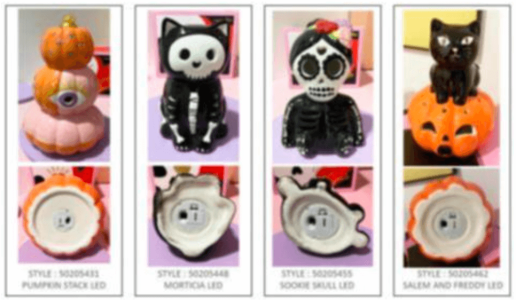Two major Australian retailers slapped with hefty fines for stocking dangerous products
- Replies 10
We all love a good deal, right? Saving some money is always great, but what happens when the bargain you're eyeing poses a threat to your safety or that of your loved ones? That's definitely not a deal worth taking.
Many SDC members have expressed concern over the seemingly growing number of recalls in Australia and, for once, it seems there are consequences for the businesses.
Recently, two major Australian retailers, The Reject Shop and Dusk, learned this lesson the hard way. They were slapped with heavy fines by the Australian Consumer and Competition Commission (ACCC) for selling novelty items that contained hazardous button batteries.
These tiny but powerful batteries were embedded in Halloween-themed items like pumpkin, cat, and skull designs. It sounds pretty cute and harmless, right? But not so fast.
If swallowed or ingested by young children or pets, these button batteries can cause serious health problems and even prove to be fatal. The ACCC imposed these fines in response to new battery safety standards, and they are the first of their kind.

The consequences of not adhering to product safety regulations can be severe — both companies were found to be in breach of mandatory product safety and information requirements and faced significant fines from the ACCC. The Reject Shop was fined $133,200, while Dusk had to pay $106,560.
Dusk sold over 7,700 potentially dangerous items over two months before issuing a voluntary recall, while The Reject Shop sold over 20,700 products with button batteries over approximately three months before withdrawing them in mid-December.
These items could have posed a serious risk to the health and safety of customers, especially young children and pets if the embedded button batteries were ingested.
Additionally, The Reject Shop faced an extra infringement notice for failing to test two of its product models before offering them for sale to customers. Although the products were tested later on, their lack of initial testing raises concerns about the companies' commitment to safety.
ACCC deputy chair Catriona Lowe has highlighted this alarming behaviour displayed by both Dusk and The Reject Shop. Lowe expressed concern that the companies' failure to test products before selling them could result in a significant risk of injury or death for young children.
Despite being fined, The Reject Shop has not acknowledged any wrongdoing. In contrast, Dusk has admitted to failing to meet the necessary safety and information requirements for its Halloween products. The company received eight infringement notices and a court-enforceable undertaking as a result.
Dusk's products also failed to undergo testing, while four products allegedly would not have met safety standards if tested.
According to Catriona Lowe, button batteries present a severe hazard to young children. She stated, 'Button batteries are extremely dangerous for young children, and tragically, children have been seriously injured or died from swallowing or ingesting them.'
To address these concerns, new safety rules were implemented last year. All products containing button batteries must now offer secure compartments to prevent child access, and the batteries themselves must be sold in child-resistant packaging.
The ACCC has reported that three children in Australia have died from incidents involving button batteries, and more than one child per month has suffered severe injuries from ingesting or inserting the batteries.
To prevent future safety breaches, Dusk has agreed to implement a three-year compliance program, while The Reject Shop has committed to enhancing existing compliance procedures and providing staff with additional training.

The recent fines levied against The Reject Shop and Dusk highlight the importance of adhering to product safety regulations. It's crucial for businesses to prioritise the safety of their customers and not just focus on profits.
But what can we, as consumers, do to protect ourselves and our loved ones from potentially hazardous products? One way is to stay informed and aware of the latest product safety guidelines and regulations.
We can also be proactive by checking the labels of the products we purchase, especially those that contain batteries, and making sure they meet the necessary safety standards.
Additionally, if you have young children, grandchildren or pets at home, it's essential to be vigilant and keep potentially hazardous products out of their reach. This includes not only button batteries but also other small objects that can be ingested.

At the end of the day, ensuring product safety is a collective effort that involves manufacturers, regulators, and consumers alike. By working together, we can create a safer marketplace and protect ourselves and our loved ones from harm.
What are your thoughts on this issue? Have you ever encountered a potentially hazardous product? What steps do you take to ensure the safety of your purchases? Let us know in the comments below!
Many SDC members have expressed concern over the seemingly growing number of recalls in Australia and, for once, it seems there are consequences for the businesses.
Recently, two major Australian retailers, The Reject Shop and Dusk, learned this lesson the hard way. They were slapped with heavy fines by the Australian Consumer and Competition Commission (ACCC) for selling novelty items that contained hazardous button batteries.
These tiny but powerful batteries were embedded in Halloween-themed items like pumpkin, cat, and skull designs. It sounds pretty cute and harmless, right? But not so fast.
If swallowed or ingested by young children or pets, these button batteries can cause serious health problems and even prove to be fatal. The ACCC imposed these fines in response to new battery safety standards, and they are the first of their kind.

The Reject Shop and Dusk, two prominent Australian retailers, have been fined over the supply of Halloween novelty products containing potentially lethal button batteries. Credit: ACCC.
The consequences of not adhering to product safety regulations can be severe — both companies were found to be in breach of mandatory product safety and information requirements and faced significant fines from the ACCC. The Reject Shop was fined $133,200, while Dusk had to pay $106,560.
Dusk sold over 7,700 potentially dangerous items over two months before issuing a voluntary recall, while The Reject Shop sold over 20,700 products with button batteries over approximately three months before withdrawing them in mid-December.
These items could have posed a serious risk to the health and safety of customers, especially young children and pets if the embedded button batteries were ingested.
Additionally, The Reject Shop faced an extra infringement notice for failing to test two of its product models before offering them for sale to customers. Although the products were tested later on, their lack of initial testing raises concerns about the companies' commitment to safety.
ACCC deputy chair Catriona Lowe has highlighted this alarming behaviour displayed by both Dusk and The Reject Shop. Lowe expressed concern that the companies' failure to test products before selling them could result in a significant risk of injury or death for young children.
Despite being fined, The Reject Shop has not acknowledged any wrongdoing. In contrast, Dusk has admitted to failing to meet the necessary safety and information requirements for its Halloween products. The company received eight infringement notices and a court-enforceable undertaking as a result.
Dusk's products also failed to undergo testing, while four products allegedly would not have met safety standards if tested.
According to Catriona Lowe, button batteries present a severe hazard to young children. She stated, 'Button batteries are extremely dangerous for young children, and tragically, children have been seriously injured or died from swallowing or ingesting them.'
To address these concerns, new safety rules were implemented last year. All products containing button batteries must now offer secure compartments to prevent child access, and the batteries themselves must be sold in child-resistant packaging.
The ACCC has reported that three children in Australia have died from incidents involving button batteries, and more than one child per month has suffered severe injuries from ingesting or inserting the batteries.
To prevent future safety breaches, Dusk has agreed to implement a three-year compliance program, while The Reject Shop has committed to enhancing existing compliance procedures and providing staff with additional training.
Key Takeaways
- Two major Australian retailers, The Reject Shop and Dusk, were fined by the Australian Consumer and Competition Commission for selling Halloween-themed novelty items containing hazardous button batteries.
- These batteries pose a severe risk to customers, especially young children and pets, who could ingest them accidentally.
- Both companies failed to comply with mandatory product safety and information requirements outlined by the ACCC, which led to significant fines and court-enforceable undertakings, including a three-year compliance program for Dusk.
The recent fines levied against The Reject Shop and Dusk highlight the importance of adhering to product safety regulations. It's crucial for businesses to prioritise the safety of their customers and not just focus on profits.
But what can we, as consumers, do to protect ourselves and our loved ones from potentially hazardous products? One way is to stay informed and aware of the latest product safety guidelines and regulations.
We can also be proactive by checking the labels of the products we purchase, especially those that contain batteries, and making sure they meet the necessary safety standards.
Additionally, if you have young children, grandchildren or pets at home, it's essential to be vigilant and keep potentially hazardous products out of their reach. This includes not only button batteries but also other small objects that can be ingested.

We must report any unsafe products to the relevant authorities to prevent others from being put at risk. Credit: Unsplash/Phillip Goldsberry.
At the end of the day, ensuring product safety is a collective effort that involves manufacturers, regulators, and consumers alike. By working together, we can create a safer marketplace and protect ourselves and our loved ones from harm.
What are your thoughts on this issue? Have you ever encountered a potentially hazardous product? What steps do you take to ensure the safety of your purchases? Let us know in the comments below!







